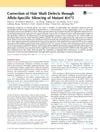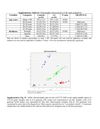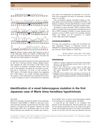1 citations,
September 2021 in “Journal of Cosmetic Dermatology” Certain gene variations may increase the risk of hair loss in Egyptians.
 October 2022 in “Journal for Research in Applied Sciences and Biotechnology”
October 2022 in “Journal for Research in Applied Sciences and Biotechnology” Certain changes in the SHBG gene may increase the risk of PCOS in Iraqi women.
June 2021 in “The American Journal of the Medical Sciences” Androgenetic alopecia is linked to a higher risk of coronary heart disease due to certain genetic factors and high homocysteine levels.
 August 2023 in “Sabuncuoglu Serefeddin Health Sciences”
August 2023 in “Sabuncuoglu Serefeddin Health Sciences” CT60 polymorphism might increase the risk of Alopecia Areata.
 March 2009 in “International Journal of Dermatology”
March 2009 in “International Journal of Dermatology” The androgen receptor gene doesn't help identify women likely to have female pattern hair loss.
 30 citations,
July 2019 in “Endocrinology”
30 citations,
July 2019 in “Endocrinology” Certain HSD3B1 gene types are linked to worse prostate cancer outcomes and affect treatment response and other health conditions.
 6 citations,
September 2015 in “Journal of Investigative Dermatology”
6 citations,
September 2015 in “Journal of Investigative Dermatology” Using special RNA to target a mutant gene fixed hair problems in mice.
 12 citations,
January 2016 in “Journal of Assisted Reproduction and Genetics”
12 citations,
January 2016 in “Journal of Assisted Reproduction and Genetics” Certain gene variations are linked to higher male hormone levels in Chinese women with PCOS and insulin resistance.
March 2021 in “Medico-Legal Update” The androgen receptor gene doesn't affect women with recurrent spontaneous abortions, but having a mutant genotype might protect against it.
6 citations,
December 2022 in “Journal of Infection” The ACE1 gene variant doesn't affect long-COVID symptoms.
 January 2024 in “Authorea (Authorea)”
January 2024 in “Authorea (Authorea)” STK11 gene polymorphism does not predict metformin response in PCOS.
 77 citations,
April 2009 in “British Journal of Dermatology”
77 citations,
April 2009 in “British Journal of Dermatology” Aromatase gene variation may increase female hair loss risk.
 16 citations,
January 2012 in “European Journal of Endocrinology”
16 citations,
January 2012 in “European Journal of Endocrinology” The study suggests certain ACE gene variations are more common in women with PCOS and may be linked to increased insulin resistance.
 3 citations,
February 2011 in “Journal of Biomedical Research/Journal of biomedical research”
3 citations,
February 2011 in “Journal of Biomedical Research/Journal of biomedical research” A new mutation in the KRT86 gene was found to cause the hair disorder monilethrix in a Han family.
 July 2019 in “Journal of the Formosan Medical Association”
July 2019 in “Journal of the Formosan Medical Association” Melatonin may help with nerve pain, a hepatitis C drug is effective but has side effects, a treatment for mouth sores works but can cause blood issues, ear reconstruction with an implant is safe, HIV transmission from mother to child in Taiwan is now 0% with treatment, certain blood problems are more common in people with a tongue condition, a gene and being overweight are linked to hair loss in some women, a new technique could reduce radiation for lung nodule patients, a hepatitis treatment may lower cancer recurrence after a procedure, and adding extra screening improves tuberculosis detection in patients with lung infections.
 1 citations,
February 2009 in “Clinical Genetics”
1 citations,
February 2009 in “Clinical Genetics” New genes linked to male pattern baldness were found on chromosome 20p11.
 20 citations,
December 2000 in “Fertility and Sterility”
20 citations,
December 2000 in “Fertility and Sterility” The N363S gene variant does not cause higher adrenal androgen levels in women with polycystic ovary syndrome.
 June 2006 in “British Journal of Dermatology”
June 2006 in “British Journal of Dermatology” Lower adrenal hormone levels may cause hair loss in postmenopausal women, certain patterns help diagnose nail cancer, and a gene variant linked to higher skin cancer risk in kidney transplant patients suggests monitoring folate levels.
13 citations,
September 2007 in “International Journal of Dermatology” Vitamin D receptor gene variations are not linked to alopecia areata.
55 citations,
November 2010 in “Journal of Allergy and Clinical Immunology” The L412F variant of TLR3 is linked to skin infections, more viral infections, and autoimmune issues.
 March 2024 in “Skin research and technology”
March 2024 in “Skin research and technology” High CRP levels could indicate vitamin D deficiency in people with alopecia areata.
 October 2023 in “Journal of pharmaceutical investigation”
October 2023 in “Journal of pharmaceutical investigation” Finasteride dosages should be adjusted based on CYP3A5 genotype and liver function to avoid side effects.
 May 2024 in “JAMA Dermatology”
May 2024 in “JAMA Dermatology” Oral contraceptive use may increase the risk of frontal fibrosing alopecia in women with a specific CYP1B1 gene variant.
 2 citations,
May 2023 in “Journal of Advanced Research”
2 citations,
May 2023 in “Journal of Advanced Research” Two mutations in KRT74 and EDAR genes cause sheep to have finer wool.
Certain genes may influence hair loss differently in men and women.
 October 2004 in “European Neuropsychopharmacology”
October 2004 in “European Neuropsychopharmacology” Impulsiveness is common across various psychiatric disorders and linked to many psychological symptoms.
 7 citations,
July 2020 in “Immunological Investigations”
7 citations,
July 2020 in “Immunological Investigations” The rs231775 genetic variant is linked to a higher risk and severity of Alopecia Areata in males.
 6 citations,
January 2013 in “The Journal of Dermatology”
6 citations,
January 2013 in “The Journal of Dermatology” Researchers found a new genetic mutation causing a rare hair loss condition in the first Japanese child studied.
 4 citations,
November 2020 in “BMC Dermatology”
4 citations,
November 2020 in “BMC Dermatology” Researchers identified genes in scalp hair follicles that may affect hair traits and hair loss.
 October 2011 in “Journal of dermatology”
October 2011 in “Journal of dermatology” A man with a rare skin condition and a new gene mutation developed high calcium levels due to his treatment.






















